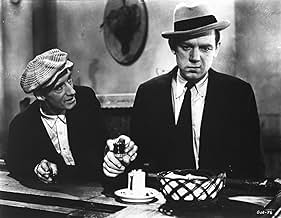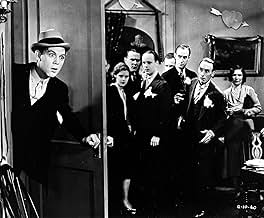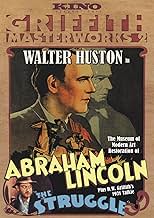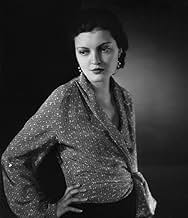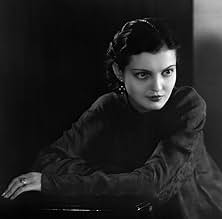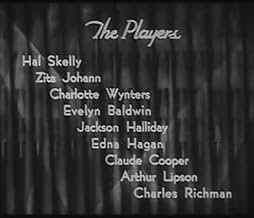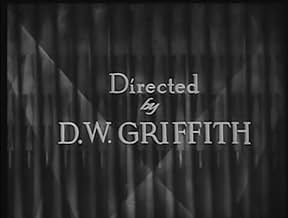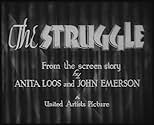A young couple's marriage is jeopardized by the husband's descent into alcoholism.A young couple's marriage is jeopardized by the husband's descent into alcoholism.A young couple's marriage is jeopardized by the husband's descent into alcoholism.
- Director
- Writers
- Stars
Kate Bruce
- Granny
- (uncredited)
Tammany Young
- Barfly
- (uncredited)
- Director
- Writers
- All cast & crew
- Production, box office & more at IMDbPro
Featured reviews
I'm glad to see that the previous comments have been charitable. It's interesting that Griffith was filming the same type of story back in 1909 at Biograph. There are several characteristic Griffith touches in this film -- for instance, the tenderness of the wife when her husband first comes home drunk to her, and in the penultimate scene at his bedside. I'm sorry this picture never had a general release because it is well worth seeing. Chaplin made a silent film as late as 1931; perhaps Griffith should have taken a chance and done that with "The Struggle," because it may have worked better as a silent. References are made to the early days of Griffith's career in the opening scenes of the film; 1911 would seem to have been more remote to a 1931 audience than, perhaps, 1987 seems to us today. A fascinating film.
THE STRUGGLE (United Artists, 1931), directed by the legendary D.W. Griffith of such silent screen classics as THE BIRTH OF A NATION (1915), INTOLERANCE (1916), WAY DOWN EAST (1920), ORPHANS OF THE STORM (1921), takes the director's chair for the last time for his second talkie. Following his biographical all-talking success of ABRAHAM LINCOLN (1930) starring Walter Huston, Griffith's work for THE STRUGGLE turns out to be something more heavy-handled in regards to one man's struggle with alcoholism. Featuring a cast of unknowns rather than actors from the Griffith stock company of the past, the story is headed by stage performers of Hal Skelly, with some talkies to his credit, the best noted being THE DANCE OF LIFE (Paramount, 1929); and Zita Johann, better known to many for her performance opposite Boris Karloff in THE MUMMY (Universal, 1932), each doing their best in a scripted story by Anita Loos.
FORWARD: "This is a true narrative based on actual fact mirroring what is happening to thousands of families throughout the land. While 'The Struggle' is a powerful indictment of bootleg liquor emphasizing its devastating effect on American youth, it is not presented as a preachment either or against Prohibition. The picture, however, does raise these questions: If Prohibition is a success that people claim it is, how could all these things have happened? Is man's struggle against intemperance controllable by law, or is it solely a matter of individual characters." Prologue: 1911. Against the underscoring to "In the Good Old Summertime," couples are gathered together drinking and dancing at a beer garden, some discussing the current events of the day of movie actress, Mary Pickford, and of Ziegfeld Follies girl Peggy Joyce " getting married again." Move forward to 1923, where music has been jazzed up, and Prohibition and bootlegging liquor is in the news. Jimmy Wilson (Hal Skelly) is seen at a speakeasy socializing and boozing it up with the patrons. One of them in attendance is Florrie (Zita Johann), who not only loves Jimmy but wants him to stop drinking. They soon marry with Jimmy promising never to drink liquor again. Their marriage is blessed with a daughter, Mary (Edna Hagen), and Jimmy keeping true to his promise until he takes a drink again. His drunken appearance and obnoxious manner soon spoils the engagement party for his sister, Nan (Evelyn Baldwin) to Johnnie Marshall (Jackson Halliday), which finds him fired by his employer, Mr. Craig (Charles Richman), also a guest at the event. Jimmy's boozing puts a strain of his marriage, especially after his involvement with Nan (Charlotte Wynters), a cabaret girl who, along with her boyfriend, wipes him out of his savings, leaving his family to lose their apartment. Jimmy becomes a homeless bum of the streets, followed by a series of other unforeseen circumstances.
While melodramatic themes about alcoholism might have worked better during the silent 1920s movie era reflecting upon the Prohibition era (or possibly the film noir realism style of the 1940s in the wake of Ray Milland's powerful Academy Award winning performance as an alcoholic in THE LOST WEEKEND (Paramount, 1945)), Griffith's THE STRUGGLE only became a notorious flop. Possibly the reason for its theatrical failure comes at the time of its release (being the peek of the Great Depression), or possibly how the movie itself being poorly constructed with a outdated acting style with script reflecting back to the silent movie days. While THE STRUGGLE did have some fresh new faces, so to speak, in the cast, its direction by Griffith must have seemed out of date for 1931 or ahead of its time by today's standards. The actors do what's expected pf them, but there's something lacking here to make this into a strong and powerful story. There have been other movies of this nature with depressing theme with realistic and unpleasant motivations that have proven successful, THE STRUGGLE. however, didn't garner any Academy Award nominations and the success of THE LOST WEEKEND.
Unseen for decades probably due to its reputation, to date, THE STRUGGLE has never been shown on television, except for clips on the film on documentaries on D.W. Griffith. A struggle for some, a curiosity for others, THE STRUGGLE is of notability today solely on the D.W. Griffith name attached to it, especially for movie scholars and fans of the director's work. This 76 minute feature film production has become available for rediscovering on DVD from Kino Video with Griffiths ABRAHAM LINCOLN on its flip-side. (*1/2)
FORWARD: "This is a true narrative based on actual fact mirroring what is happening to thousands of families throughout the land. While 'The Struggle' is a powerful indictment of bootleg liquor emphasizing its devastating effect on American youth, it is not presented as a preachment either or against Prohibition. The picture, however, does raise these questions: If Prohibition is a success that people claim it is, how could all these things have happened? Is man's struggle against intemperance controllable by law, or is it solely a matter of individual characters." Prologue: 1911. Against the underscoring to "In the Good Old Summertime," couples are gathered together drinking and dancing at a beer garden, some discussing the current events of the day of movie actress, Mary Pickford, and of Ziegfeld Follies girl Peggy Joyce " getting married again." Move forward to 1923, where music has been jazzed up, and Prohibition and bootlegging liquor is in the news. Jimmy Wilson (Hal Skelly) is seen at a speakeasy socializing and boozing it up with the patrons. One of them in attendance is Florrie (Zita Johann), who not only loves Jimmy but wants him to stop drinking. They soon marry with Jimmy promising never to drink liquor again. Their marriage is blessed with a daughter, Mary (Edna Hagen), and Jimmy keeping true to his promise until he takes a drink again. His drunken appearance and obnoxious manner soon spoils the engagement party for his sister, Nan (Evelyn Baldwin) to Johnnie Marshall (Jackson Halliday), which finds him fired by his employer, Mr. Craig (Charles Richman), also a guest at the event. Jimmy's boozing puts a strain of his marriage, especially after his involvement with Nan (Charlotte Wynters), a cabaret girl who, along with her boyfriend, wipes him out of his savings, leaving his family to lose their apartment. Jimmy becomes a homeless bum of the streets, followed by a series of other unforeseen circumstances.
While melodramatic themes about alcoholism might have worked better during the silent 1920s movie era reflecting upon the Prohibition era (or possibly the film noir realism style of the 1940s in the wake of Ray Milland's powerful Academy Award winning performance as an alcoholic in THE LOST WEEKEND (Paramount, 1945)), Griffith's THE STRUGGLE only became a notorious flop. Possibly the reason for its theatrical failure comes at the time of its release (being the peek of the Great Depression), or possibly how the movie itself being poorly constructed with a outdated acting style with script reflecting back to the silent movie days. While THE STRUGGLE did have some fresh new faces, so to speak, in the cast, its direction by Griffith must have seemed out of date for 1931 or ahead of its time by today's standards. The actors do what's expected pf them, but there's something lacking here to make this into a strong and powerful story. There have been other movies of this nature with depressing theme with realistic and unpleasant motivations that have proven successful, THE STRUGGLE. however, didn't garner any Academy Award nominations and the success of THE LOST WEEKEND.
Unseen for decades probably due to its reputation, to date, THE STRUGGLE has never been shown on television, except for clips on the film on documentaries on D.W. Griffith. A struggle for some, a curiosity for others, THE STRUGGLE is of notability today solely on the D.W. Griffith name attached to it, especially for movie scholars and fans of the director's work. This 76 minute feature film production has become available for rediscovering on DVD from Kino Video with Griffiths ABRAHAM LINCOLN on its flip-side. (*1/2)
By the time he made this film, Hollywood had D.W. Griffith right where they wanted him; a broken man. His studio was gone and he was selling out his UA shares--to make this film, I think. It's a shame that things went so wrong for him at this time, for it is evident in "The Struggle" that he was figuring out how to use this new sound gizmo. I was very impressed by his use of sound, almost Altman-like at times with overlapping dialogues. But, sadly, Hollywood had moved beyond DW, and didn't need or want him around anymore. This film is not the calibre of "Broken Blossoms" or "Intolerance", but it's a fine effort on a small scale from one of filmdom's greats.
I hesitated for some time before seeing "The Struggle" because it was considered by most critics to be a pathetic boring mess done by a broken man. I knew it was Griffith's final film and I didn't want to see this great master produce a terrible film at the end of his career. When I finally did view it I found that a film that is full of passion, new ideas and bold innovative strokes.
There are several innovations in the use of sound. At the time actors were careful to talk one after the other because it was thought that people talking at the same time would be too confusing for the audience. Griffith used overlapping dialog and a party scene with multiple background sounds of music and talking as well as dialog. This sounded far more natural. Also at this time actors were being told to use artificial elocution and diction when speaking on screen. They usually sounded either foreign or very upper crust. Griffith had his actors use natural accents. Hal Skelly and Zita Johnson sound like normal people who talk fast use slang and sometimes slur their words.
The most impressive innovation was in Griffith's development of the plot. The story of a man who sinks into alcoholism could and would normally be treated as a moral lesson against the evils of drink. In Griffith's hands it is personal tragedy that has to do with the strength's and weakness of the individuals involved. Jimmy becomes an alcoholic because of his own personality traits and whatever redemption he achieves is due to the strength of his love for his wife and his daughter. There is no preaching here. Griffith had done a similar film called "Isn't Life Wonderful" in Germany which influenced German filmmakers particularly Pabst in his "Joyless Street." "Joyless Street" is innovative in it's own right but it is clear where its inspiration comes from when whole sections of it are lifted from "Isn't Life Wonderful".
"The Struggle" was a financial failure. Without enough personal funds and without the confidence of any backers, Griffith would never make another film. He had lost touch with his audience. Caught in the middle of the Great Depression, American audiences wanted a moral lesson so they could fix blame, or pure escapism. The last thing they wanted was a complex personal drama to remind them of their own complex personal problems. It would be a long time before films like this would be made in America. But although Griffith had lost his audience, enough creative artists must have seen and been influenced by this film, because starting with films like Citizen Kane, we began to see films about difficult problems treated as stories that were personal to the characters involved and not as moral lessons.
There are several innovations in the use of sound. At the time actors were careful to talk one after the other because it was thought that people talking at the same time would be too confusing for the audience. Griffith used overlapping dialog and a party scene with multiple background sounds of music and talking as well as dialog. This sounded far more natural. Also at this time actors were being told to use artificial elocution and diction when speaking on screen. They usually sounded either foreign or very upper crust. Griffith had his actors use natural accents. Hal Skelly and Zita Johnson sound like normal people who talk fast use slang and sometimes slur their words.
The most impressive innovation was in Griffith's development of the plot. The story of a man who sinks into alcoholism could and would normally be treated as a moral lesson against the evils of drink. In Griffith's hands it is personal tragedy that has to do with the strength's and weakness of the individuals involved. Jimmy becomes an alcoholic because of his own personality traits and whatever redemption he achieves is due to the strength of his love for his wife and his daughter. There is no preaching here. Griffith had done a similar film called "Isn't Life Wonderful" in Germany which influenced German filmmakers particularly Pabst in his "Joyless Street." "Joyless Street" is innovative in it's own right but it is clear where its inspiration comes from when whole sections of it are lifted from "Isn't Life Wonderful".
"The Struggle" was a financial failure. Without enough personal funds and without the confidence of any backers, Griffith would never make another film. He had lost touch with his audience. Caught in the middle of the Great Depression, American audiences wanted a moral lesson so they could fix blame, or pure escapism. The last thing they wanted was a complex personal drama to remind them of their own complex personal problems. It would be a long time before films like this would be made in America. But although Griffith had lost his audience, enough creative artists must have seen and been influenced by this film, because starting with films like Citizen Kane, we began to see films about difficult problems treated as stories that were personal to the characters involved and not as moral lessons.
The Struggle (1931)
There is one main reason to see this film—it is D.W. Griffith's last. Whatever horrors he is responsible for supporting the KKK in "Birth of a Nation," he was a maverick, a brilliant innovator. This is the end of the line, twenty years after he got going full steam.
The theme here is so prominent it almost dwarfs the plot—drinking. And getting drunk. The first example of a woman being drunk at a party is almost laughable, at least to those of us who have seen more than one person who has drunk "too much."
The filming here is typical Griffith, and he moves the story through the very years of his career, and the scenes update from the teens to the twenties to the "present," meaning 1931, a year or so before the end of Prohibition. You can make a case, I think, for some kind of radical fracturing of the plot, with a whole slew of characters and story lines started in the beginning of the movie and never followed up. It avoids normal linear storytelling.
It's tough to compare to other movies from 1931—this was still generally a rough time for the movie industry getting used to sound, but we are starting to see masterful meldings of visual and aural components, along with the consistency of acting and plot. The camera doesn't do much moving, and the sound is sometimes muddled or coarse, but you can rise above the limitations and see glimmers of both brilliance and depth. Truly—glimmers I mean. This isn't a brilliant movie.
There is a pretty linear downward trend here, and almost predictable. And the scenes are increasingly simple, showing interior rooms from one point of view. What holds it up at the best moments is some intense acting (the little girl, among the brightest spots). But it's no masterpiece, and could easily be avoided on your watch list.
There is one main reason to see this film—it is D.W. Griffith's last. Whatever horrors he is responsible for supporting the KKK in "Birth of a Nation," he was a maverick, a brilliant innovator. This is the end of the line, twenty years after he got going full steam.
The theme here is so prominent it almost dwarfs the plot—drinking. And getting drunk. The first example of a woman being drunk at a party is almost laughable, at least to those of us who have seen more than one person who has drunk "too much."
The filming here is typical Griffith, and he moves the story through the very years of his career, and the scenes update from the teens to the twenties to the "present," meaning 1931, a year or so before the end of Prohibition. You can make a case, I think, for some kind of radical fracturing of the plot, with a whole slew of characters and story lines started in the beginning of the movie and never followed up. It avoids normal linear storytelling.
It's tough to compare to other movies from 1931—this was still generally a rough time for the movie industry getting used to sound, but we are starting to see masterful meldings of visual and aural components, along with the consistency of acting and plot. The camera doesn't do much moving, and the sound is sometimes muddled or coarse, but you can rise above the limitations and see glimmers of both brilliance and depth. Truly—glimmers I mean. This isn't a brilliant movie.
There is a pretty linear downward trend here, and almost predictable. And the scenes are increasingly simple, showing interior rooms from one point of view. What holds it up at the best moments is some intense acting (the little girl, among the brightest spots). But it's no masterpiece, and could easily be avoided on your watch list.
Did you know
- TriviaThis was the final feature-length film directed by D.W. Griffith.
Details
- Runtime
- 1h 27m(87 min)
- Color
- Aspect ratio
- 1.20 : 1
Contribute to this page
Suggest an edit or add missing content

